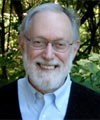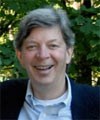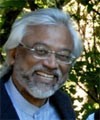Interfaith Amigos: On 9/11, Getting Beyond Religious Hatred
By Rabbi Ted Falcon, Pastor Don Mackenzie & Sheikh Jamal Rahman
15 September, 2010
Yes!Magazine
Following the events of September 11, 2001, Rabbi Ted Falcon, Pastor Don Mackenzie, and Sheikh Jamal Rahman became colleagues and friends, brought together by a desire to confront fear and hatred with earnest interfaith dialogue. Known collectively as the "Interfaith Amigos," they blog weekly for YES! Magazine.
 Rabbi Ted Falcon: A Time to Honestly Examine Our Intolerance
Rabbi Ted Falcon: A Time to Honestly Examine Our Intolerance
Some months ago, considering the approach of 9/11, we imagined that the activities of commemoration would largely defer to 2011, the year that will mark the 10th anniversary of the event that changed all of us forever. But our imaginings have been rudely shattered by the events of these past weeks.
Our country, and much of the world, is now focused on threats made by the pastor of a small church in Florida to publicly burn the Quran. The plan to construct a Muslim Cultural Center two blocks from Ground Zero in lower Manhattan—emphasizing interfaith facilities and announced months ago to little or no notice—has become a major issue of political and religious contention. And angry voices raised against new and existing mosques in various parts of the country are not possible to ignore.
Amidst it all, the ninth anniversary of 9/11 is upon us. The increased level of interfaith intolerance and fear is drawing responses from all those interested in pursuing peaceful, interreligious relationships and with preserving the basic freedom of religious expression at the heart of our Constitution.
I share their concerns and support their actions, but I must admit that I am actually glad to see this intolerance surfacing. For too long, we have wanted to believe that we are beyond such difficulties; we have imagined ourselves at home in a multireligious society with mutual respect and support. When the distrust, suspicion, and even hatred of another faith are hidden, there is no way to enter into a healing dialogue. Once revealed, there is at least the possibility for change. I am not glad for the intolerance, but I am relieved that it is no longer so hidden. I am glad that at least some of the pretense has been torn away.
In Judaism, Christianity, and Islam, there are teachings of great beauty, and it is crucial that we become more aware of such precious verses. The Torah, the New Testament, and the Quran all contain exceptional teachings instructing us to love God, to love one another, and to care for all people. And in each of these traditions, there are teachings promoting an exclusivity that belies these very universal teachings. In the years that we have been working together, Imam Jamal Rahman, Pastor Don Mackenzie, and I have learned how crucial it is that we honor both the universal as well as the particularly exclusivist teachings of each of our faith traditions.
What is far more usual is for us to be aware only of the exclusivities of another’s faith, and the universals of our own. We see faults in another’s texts, but fail to notice how our own texts mirror the same faults. This is the challenge that now meets us, and the way we handle it will determine the degree to which we will survive in a multicultural, multireligious community.
In the past, interfaith dialogue has largely focused on sharing the wonderful and beautiful teachings in each faith. Yet such a focus does little to foster the kind of understanding that leads to true mutual trust and support. We cannot count the number of groups we have spoken with during this past year who report to us their wonderful interfaith activities. Of course, they add, they stay away from discussions of the “problem areas.”
The current explosion of distrust is evidence that this kind of dialogue will never allow us to confront the issues that we perceive dividing us. It’s time to begin a much more profound dialogue in which we share not only the powerful universal teachings in each of our traditions, but also the ways in which each tradition frames its claims of exclusivity.
The time for covering up and ignoring the difficult conversations has passed. It’s time to get real with one another.
 Pastor Don Mackenzie: From Conflict to Creative Solutions
Pastor Don Mackenzie: From Conflict to Creative Solutions
Among the many themes being played out in the controversy in New York surrounding the approval to build a mosque near Ground Zero is the assumption that Islam is a religion of violence and hatred. Therefore we should fear it, the argument goes. We should oppose not only that project but mosques everywhere in the United States.
Islam is no more a religion of violence and hatred than Christianity and Judaism have been at various times in their histories. My interfaith colleagues, Rabbi Ted Falcon and Sheikh Jamal Rahman, and I have found that religion, because of the authority it commands, is often summoned as a cover for other concerns. In the case of the acts of terrorism that destroyed lives and property in New York and Washington D.C., it is true that the people who were responsible for those acts were Muslims. In fact, they were angry Muslims. So while the events of September 11, 2001 might seem to be about religion, they were really about anger—anger coming out of a history of colonialism and the subjection of Muslims by the powers of the West. It is anger that concerns power, self-worth, and money. It is clothed as religion. Most of the world’s Muslims do not have full access to human and civil rights. They are part of that vast portion of the world’s population sharing that reality.
If each religion in the world contained only its core teachings and the blessings that flow from those teachings, and if religious institutions were not vulnerable to losing their spiritual substance, it would be far more difficult to use the authority of religion for violent and hateful purposes. But, in addition to the core teachings and the blessings that flow from those teachings, each religion also contains verses that are inconsistent with the core teachings. Those are the verses that can be invitations for thoughtful dialogue about how the substance of religion, spirituality, can serve the common good. We would ignore the shadow sides of ourselves and our institutions at great peril. They are part of the truth of our beings.
The enemy is not out there. We need each other’s help to move up and out of the abyss of numbness that imprisons us now. Through interfaith dialogue and collaboration, we believe it is possible to create a new vision of what our world could be like. It would not be a world without conflict. But it could be a world in which conflict leads to imaginative, creative, and positive consequences, instead of evoking violence and hate. We believe this.
 Sheikh Jamal Rahman: Three Cups of Tea
Sheikh Jamal Rahman: Three Cups of Tea
The Quran has an insight about the way that chronic anger, fear, and suspicion can fester inside: “Truly, it is not their eyes that are blind but their hearts" ( 22:46). How do you open such hearts? The holy book offers a suggestion: Strive to get to know the other (49:13). In modern idiom, popularized by Greg Mortenson’s best selling book, we are asked to practice “three cups of tea:" listen, respect, and connect.
Can we bond with the Other at a human level? Can we do this with persistence, humility and sincerity? Though the task is simple, it is far from easy. But it will yield real results. Little by little, the encrustations around the heart will dissolve. Then, no matter how severe our differences are with the Other—theological, political, or cultural—these will no longer loom as a threat.
There is the remarkable story of the former mayor of Amsterdam, Job Cohen, a Jew, who regularly made time to drink tea at mosques where the imam and congregation were considered “radical." At a time when the public was outraged because of the brutal murder of Theo Van Gogh by a young Muslim terrorist, his tea drinking was derided and castigated by opponents. Later, praises were heaped on the mayor. An official report by Professor Jean Tillie of the Institute of Migration and Etnic Studies at the University of Amsterdam said that while incidents of racial and religious violence occurred around the Netherlands following the 2004 murder of Van Gogh, Amsterdam itself remained quiet. TIME magazine called the mayor a “European hero” and “hate buster.”
My abiding friendship, since 9/11, with my Interfaith Amigos, Rabbi Ted and Pastor Don, has truly helped me to learn the art of listening, along with what it feels like to be the Other. I have been inspired to reach out and apply the three cups of tea approach to more difficult situations. I am thinking specifically of two evangelical Christians whom I can truthfully describe as having been allergic to Islam.
Over the years, I have made conscious and persistent efforts to get to know these people simply as friends, without any particular agenda, and two remarkable changes have occurred. The first is that my two friends are no longer anti-Islamic, and although we continue to disagree on scriptural matters, our disagreements no longer threaten our friendship. The second and more remarkable change is the way I have been transformed. I now realize that I had my own prejudices and stereotypes about right-wing Christians, and I have come to see that they have a deep sense of commitment and dedication to social justice and earth care. There are concrete and deeply meaningful projects we can collaborate on together.
This practice of three cups of tea is essential and this labor of love was not meant to be easy. The Quran, tongue-in-cheek, says, “We have created some of you to be a trial for others. Will you have patience?”( 25:20).
The Interfaith Amigos—Rabbi Ted Falcon, Pastor Don Mackenzie, and Sheikh Jamal Rahman—blog weekly for YES! Magazine, a national, nonprofit media organization that fuses powerful ideas with practical actions. Rabbi Ted Falcon is the co-founder of Bet Alef Meditative Synagogue in Seattle, where he served as rabbi for sixteen years. Pastor Don Mackenzie retired in June of 2008 as minister and head of staff of University Congregational United Church of Christ in Seattle. Sheikh Jamal Rahman is co-founder and Muslim Sufi minister at Interfaith Community Church in Seattle and adjunct faculty at Seattle University. Together, they are the authors of Getting to the Heart of Interfaith: The Eye-Opening, Hope-Filled Friendship of a Rabbi, a Pastor, and a Sheikh.
Interested?
Read more from the Interfaith Amigos' blog.
8 Ways to Confront Extremism on 9/11
How to further tolerance and healing on this September 11th, an especially important time to speak up.
An Invitation to Sacred Intention
Three friends from different faiths offer guidance for forming intentions that focus not on what we do or have, but on who we are.
YES! Magazine encourages you to make free use of this article by taking these easy steps. This work is licensed under a Creative Commons License

